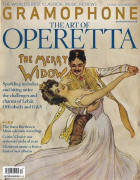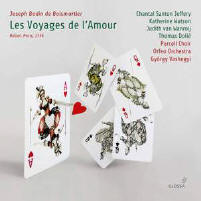Texte paru dans: / Appeared in: |
|
|
Outil de traduction (Très approximatif) |
|
|
Reviewer:
Richard Wigmore Sometimes dubbed ‘the French Telemann’, Joseph Bodin de Boismortier was both admired and mocked for what a contemporary versifier ambiguously called his fertile plume. The grace and easy, Italian-influenced melodiousness of his music ensured his abiding popularity – and wealth – in Louis XV’s Paris. Staged at the Opéra in 1736, the ballet Les voyages de l’Amour – given here with two alternative versions of Act 2 – was a perfect vehicle for Boismortier’s talents. In the slender plot, the disguised Cupid leaves his love-island of Cythera to move between country, town and court in search of a constant lover. Predictably, pastoral innocence, in the form of the faithful shepherdess Daphné, prevails over the shallow cynicism of court and city. Touched by her sincerity, Cupid reveals his true self, and all celebrate their union with singing and dancing. You could never accuse Boismortier of long-windedness. A total of 130 tracks on these two discs says it all. You’ll look in vain in this premiere recording for the breadth and range of Rameau’s near-contemporary Les Indes galantes. But among the series of tiny vignettes – airs, duets, dances and choruses – there is plenty to beguile. Using a wide palette of instrumental colours, including a hurdy-gurdy, Boismortier has a delicate sense of the picturesque, with flutes and bassoons especially favoured. Wistful minuets, chic gavottes and jaunty tambourins and rigaudons thread their way agreeably through the score. Most memorable of the airs is the exquisitely languid sommeil for Daphné in the final act, sung with drowsy sensuality by Judith van Wanroij, who later reveals a touch of steel in her limpid tone as she denounces her apparently faithless lover (Cupid in disguise). The rest of the soprano-dominated cast, all well-versed in the French Baroque, are equally good, both in song and lively declamation. All make much of the text. As a guileful, ultimately sympathetic Cupid, Chantal Santon Jeffery could hardly be bettered, whether in her smiling solos in the Prologue or the mock-pathos of her wooing of Daphné. Katherine Watson copes well with the high tessitura of the solos for Cupid’s sidekick Zéphire, blithely dispatching the Italianate coloratura aria with recorders ‘Les ris, le jeux’. The sweet-toned Katia Velletaz is delightful as the upwardly mobile Lucile, egged on by her worldly nurse (saltily played by Eléonore Pancrazi) to dump her lover in favour of the son of Venus. Although he can reach over-optimistically for low notes, the one male cast member, Thomas Dolié, sings with sturdy relish in roles that include a preening court Lothario and a soothsayer. He and Pancrazi are specially impressive where Boismortier is at his most dramatically vivid, in the darkly coloured oracle scene in which the soothsayer calls up the génies élémentaires. That avid explorer of French operatic rarities, György Vashegyi, directs his Hungarian forces with his usual zest (the pacing of the dialogues seems spot on) and feeling for colour. The many instrumental solos, not least the gurgling bassoons, are first-rate, while the Purcell Choir are spirited in attack and always alive to the words. There is an excellent introduction by Boismortier scholar Benoît Dratwicki, plus full text and translation. If you fancy a varied dose of Gallic mellifluousness, performed with charm and style, pleasure is guaranteed. |
|




